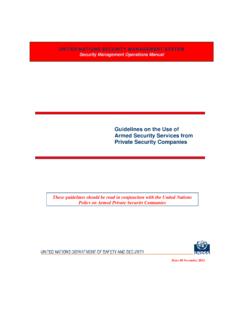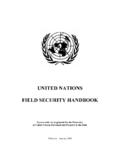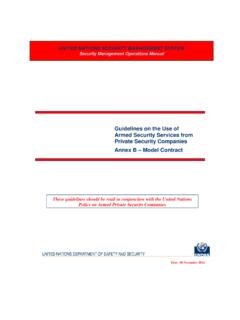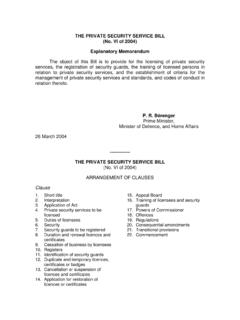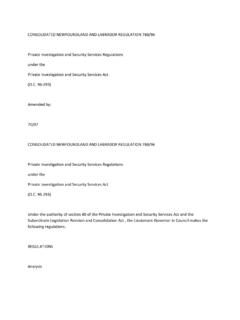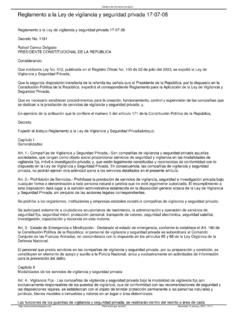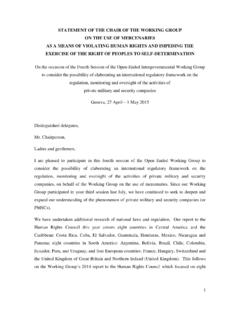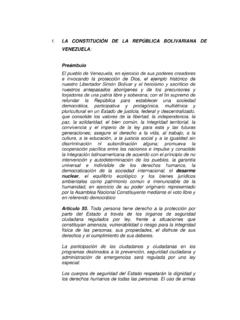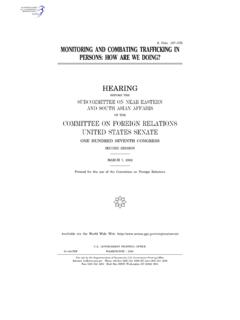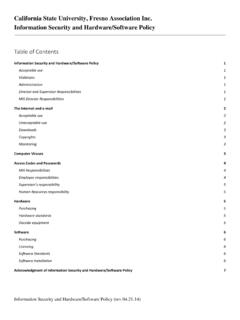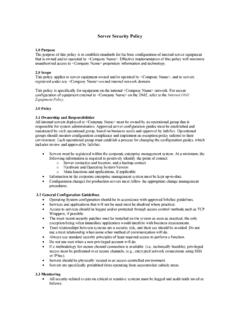Transcription of The Role of the Private Sector in Security Policy
1 CSS Analyses in Security Policy An ETH CenterCSSVol. 2 No. 6 January 2007 The Role of The PRiV aTe Sector iN Security PolicyPrivate Security and military companies are increasingly offering services that were previously provided by states. at the same time, the business Sector has been progressively integrated through public- Private partnerships into the collective management of Security Policy challenges, such as critical infrastructure protection or conflict prevention. While the trend towards dissolving the state monopoly on force raises some sensitive questions, stronger integration of the Private Sector in Security Policy is a promising approach worth developing UN summit with business leaders (Global Compact, 24 June 2004) further information, please visit.
2 Global Compact Leaders SummitUnited Nations Headquarters24 June 2004 Final ReportSummit participants gather on the West Terrace of the United Nations Secretariat Building, 24 June 2004 Two factors have significantly contributed to the rapidly increasing importance of the Private Sector for Security Policy over the past few years. first, the phenomenon of globalization has complemented the West-phalian state system with a closely woven mesh of non-state actors. The increase of transnational flows of capital, goods, serv-ices, and people, which has been favored by economic liberalization and privatization as well as new information technology, has diminished the importance of the state s regulative , the conflict and threat picture has changed since the end of the cold War in a way that confronts the entrepreneurial Sector more directly and immediately with Security Policy challenges.
3 Most violent con-flicts today are located outside of the oecD area. Since a growing number of the more than 60,000 transnational corporations also operates in transition and developing countries, the Private Sector is increasingly affected by political-military crises. in most cases, these conflicts take place within states, and civilians and Private installa-tions are frequently and consciously select-ed as targets, exposing companies to high risks. conversely, these companies can also cause or exacerbate conflict through their own behavior in instable enterprises are also affected by the so-called new risks that have dominated Western threat perceptions for several years now.
4 Dangers emanating from terror-ism, the proliferation of weapons of mass destruction, or organized crime underscore the fact that companies today can no long-er simply pursue their core business and ignore developments relevant to Security Policy . at the same time, these threats in-dicate that both public and Private actors have at least partially analogous interests in promoting peace and Security and military companies an analysis of the Private Sector as a se-curity Policy actor allows us to distinguish between two kinds of companies: Private Security and military firms that are spe-cialized on providing Security services that were previously in the domain of the na-tion-state, and the much larger group of companies that are increasingly affected by Security Policy challenges and engage in alleviating notion of privatized Security services is not new.
5 Before the age of the nation-state, mercenaries were part of the ordinary re-cruitment potential of the european royal courts. it is noticeable, however, that pri-vate Security companies have grown sig-nificantly in terms of both numbers and importance in recent years. There are more than 100 internationally active Security and military firms today. The global market volume of this Sector is estimated at over uS$100 billion a year. Such companies of-fer a broad array of services that increas-ingly encroach on the core responsibilities of state Security Policy . Services include guarding property and installations such as embassies and airports, bodyguard serv-ices and convoy duties, as well as military 2006 center for Security Studies (cSS), eTh Z rich CSS Analyses in Security Policy Vol.
6 2 No. 6 January 2007services in the area of logistics, consulting and training, operating complex weapons systems, intelligence operations, or even actual combat missions. Their customers include states as well as international or-ganizations, companies, and NGos. it is in the uS that Private companies have made the broadest inroads into state tasks, espe-cially in the uS armed forces, but the same trend has also generally established itself in idea of subcontracting guard and en-forcement duties in the area of domestic se-curity is relatively uncontroversial in West-ern states. Neither has there been a great deal of criticism in cases where weak states such as Sierra leone have taken recourse to military contractors to fight rebel groups.
7 However, there is heated debate over the rapidly increasing delegation of state du-ties during Security operations of Western states in conflict areas. This discussion has been triggered by the development in iraq, where more than 20,000 employees of pri-vate Security and military firms are engaged today, providing more troops than the col-lective personnel strength of the uS s coa-lition partners. While the 1990-1 Gulf War featured a ratio of one contractor per 50 uS soldiers, that proportion had already risen to 1:10 in the case of operation iraqi free-dom in 2003. Shocking televised images contributed to a growing public awareness of the existence of Private Security compa-nies.
8 In March 2004, for example, four em-ployees of a uS military firm were murdered in the town of fallujah and their bodies des-ecrated and dragged through the streets. The fact that Private Security staff hired for translation and interrogation services were involved in the torture of prisoners at abu Ghraib prison also resonated strongly among the defense budgets and low public tol-erance for military casualties, accompanied by an increasing requirement for military operations, are three main reasons for the massive increase in the importance of pri-vate Security services in crisis areas. This development, however, raises some serious questions.
9 Even if the majority of states have so far retained ultimate responsibility for fulfilling their core tasks, their monopo-ly on force and therefore their legitimacy is in danger of being hollowed out. This is all the more disquieting when the near-total absence of oversight of Private Security and military firms is taken into account. only few Western states have regulated the use in crisis regions of such contractors that operate from their territory. Nor are such companies generally subject to supervi-sion by the countries that are parties to the conflict. While there are applicable norms at the level of international law, enforcing them has proven extremely difficult.
10 The le-gal status of Private - Sector contractors per-forming state functions is generally enlistment of Private Security compa-nies by states should certainly not entirely be regarded as a negative phenomenon, as outsourcing can result in the provision of more economical and efficient services. Genuine privatization, however, can only be considered in areas that are subsidiary to the core capabilities of a military force. legal and administrative regulations for se-curity and military firms are also required. This goal may not be easy to attain, how-ever, since some states are not interested in tightening control over aspects of their foreign Policy that they have outsourced.
